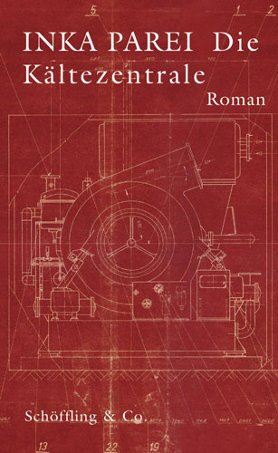Inka Parei
Die Kältezentrale
[The cooling station]
- Schöffling & Co.
- Frankfurt am Main 2011
- ISBN 978-3-89561-107-0
- 210 Pages
- Publisher’s contact details
Inka Parei
Die Kältezentrale
[The cooling station]
This book was showcased during the special focus on Russian (2012 - 2014).
Sample translations
Review
The nameless first-person narrator of Inka Parei’s Die Kältezentrale [The cooling station] receives an unexpected phone call from his ex-wife Martha, who is in the hospital and dying of cancer. To correctly diagnose her condition and find an appropriate therapy, she must find out what had happened to her 20 years ago. Martha’s unexpected reappearance in the narrator’s life and her request for his help sets off a chain of events that hurls him from the present day into the past. The narrator returns to Berlin, the city of his former life, and tries to reconstruct the events and circumstances of a truck traveling from the Ukraine in early May 1986 that she had come into contact with. The journey catapults him from a supposedly secure present into dealing with a time he had thought was long gone. One question leads to another and soon his past catches up to him: was the truck contaminated with radiation? What exactly was Martha doing in the truck back then? What does all of this have to do with Hansmann’s death, which he feels responsible for?
Berlin-based writer Inka Parei, recipient of both the Nossack and Bachmann Prizes, creates a unique story of a desperate search for identity against a political and historical backdrop. Unlike many contemporary expeditions into history, this journey boasts a suspenseful plot that draws the reader into the story. The author skillfully links the search for clues in past history to personal memory which turns out to be surprisingly unreliable.
"We called the room the cooling station." The protagonist was one of the technicians in 1986, who installed the air conditioning system for the New Germany, that is, for the building that housed the (SED), the central organ of the communist party. The prerogative of interpretation of “real existing socialism” is attributed here to an allegorical reading of switches and production site: the functioning of propaganda, the chill of the East German dictatorship, can be attributed to a machine called a "turbo-compressor”. The workers’ activities are charged with a reservoir of images pertaining to the Cold War, their activities always a struggle to be at the vanguard of the ideological front. The metaphor around “cold” also functions as a key to the various personal relationships: "She accused me of being cold," the narrator comments about Martha's departure, and yet all she had to do was give him “the warmth [he] so desperately needed.”
For the narrator cold means, "more than just a low temperature. It meant self-control, reason that subdued uncontrollable feelings," but the cooling station of the system is anything but that: The technicians responsible for keeping the upper areas temperate are exposed to extreme variations in temperature, a climate of violent aggression reigns beneath them- instead of rational coolness heated dedication is expected.
The narrator’s memory work confronts him with his then state of loneliness and isolation. As each layer of memory is stripped away, the past grows clearer; this plays a critical role not only for Martha’s cancer diagnosis, but also for his life: "There was this part of me that had remained here. [...] Since I left this city, there [was] something in me that remained incomplete." Parei’s text allows the broken, damaged biography that had resulted from the last unjust German state to be palpable without excessive dramatization.
Despite the many flashes forward and flashbacks, the riveting search for identity allows Parei’s story to move at a breathtaking pace, and not merely through a suspense-filled roller coaster "race against time" dramaturgy - at one point those very words are used. The language is condensed, sparing and this endows the text with authenticity, which combined with the rapidly changing scenes, both dreamy and nightmarish, pulls the rug from under the most pressing questions of truth and clarity.
Inka Parei succeeds seemingly en passant –as in the example of the "East-West discussions” that occur during the narrator’s first marriage, when the "mass of what was said [...] piled up in the years between us” – to create instantaneous and coherent miniatures of German history and sensibilities. Above all, she is especially able to form this search movement through a non-dogmatic opacity and create a genuinely enlightened and emancipatory project. "If only I would be able to more closely regulate all of these factors, could I finally be free of them." That it is the young contemporary writers, who without artifice, are able to aesthetically and compellingly reflect on the muddled pan-German condition is certainly not the worst sign that progress has been made in terms of dealing with the past.

Berlin-based writer Inka Parei, recipient of both the Nossack and Bachmann Prizes, creates a unique story of a desperate search for identity against a political and historical backdrop. Unlike many contemporary expeditions into history, this journey boasts a suspenseful plot that draws the reader into the story. The author skillfully links the search for clues in past history to personal memory which turns out to be surprisingly unreliable.
"We called the room the cooling station." The protagonist was one of the technicians in 1986, who installed the air conditioning system for the New Germany, that is, for the building that housed the (SED), the central organ of the communist party. The prerogative of interpretation of “real existing socialism” is attributed here to an allegorical reading of switches and production site: the functioning of propaganda, the chill of the East German dictatorship, can be attributed to a machine called a "turbo-compressor”. The workers’ activities are charged with a reservoir of images pertaining to the Cold War, their activities always a struggle to be at the vanguard of the ideological front. The metaphor around “cold” also functions as a key to the various personal relationships: "She accused me of being cold," the narrator comments about Martha's departure, and yet all she had to do was give him “the warmth [he] so desperately needed.”
For the narrator cold means, "more than just a low temperature. It meant self-control, reason that subdued uncontrollable feelings," but the cooling station of the system is anything but that: The technicians responsible for keeping the upper areas temperate are exposed to extreme variations in temperature, a climate of violent aggression reigns beneath them- instead of rational coolness heated dedication is expected.
The narrator’s memory work confronts him with his then state of loneliness and isolation. As each layer of memory is stripped away, the past grows clearer; this plays a critical role not only for Martha’s cancer diagnosis, but also for his life: "There was this part of me that had remained here. [...] Since I left this city, there [was] something in me that remained incomplete." Parei’s text allows the broken, damaged biography that had resulted from the last unjust German state to be palpable without excessive dramatization.
Despite the many flashes forward and flashbacks, the riveting search for identity allows Parei’s story to move at a breathtaking pace, and not merely through a suspense-filled roller coaster "race against time" dramaturgy - at one point those very words are used. The language is condensed, sparing and this endows the text with authenticity, which combined with the rapidly changing scenes, both dreamy and nightmarish, pulls the rug from under the most pressing questions of truth and clarity.
Inka Parei succeeds seemingly en passant –as in the example of the "East-West discussions” that occur during the narrator’s first marriage, when the "mass of what was said [...] piled up in the years between us” – to create instantaneous and coherent miniatures of German history and sensibilities. Above all, she is especially able to form this search movement through a non-dogmatic opacity and create a genuinely enlightened and emancipatory project. "If only I would be able to more closely regulate all of these factors, could I finally be free of them." That it is the young contemporary writers, who without artifice, are able to aesthetically and compellingly reflect on the muddled pan-German condition is certainly not the worst sign that progress has been made in terms of dealing with the past.

By Michael Sellhoff
Michael Sellhoff is a research associate at the Philosophical Seminar of the University of Kiel and is a freelance editor.
